Lithium AA Batteries vs Alkaline
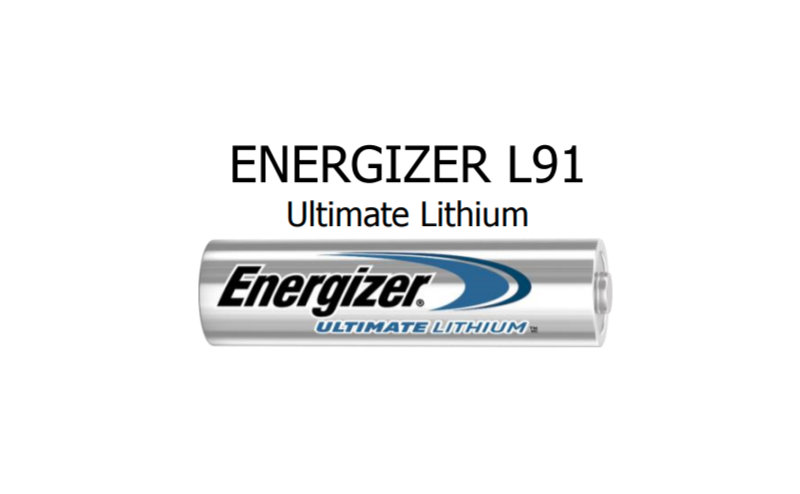
You might ask, “Are lithium AA batteries better than alkaline?” My answer and opinion is mostly yes. Although you might not need to spend the extra $ for the advantages of lithium vs alkaline – depending on the device you’re powering. I’ll explain in a minute. And I will suggest a great alkaline battery too.
I use AA lithium batteries for my battery powered devices operating in cold weather. Also for devices where more battery capacity (longer life) under moderate to heavy load is preferred. Lastly, for devices with high drain demands (e.g. 2-way handheld radios while transmitting) because lithium battery voltage is a tad higher than alkaline. Lithium battery performance characteristics are outstanding under load. So I use them in devices which demand good performance under higher loads.
[ Article Updated with current data. Originally I listed 2 reasons why lithium is better. There’s more… ]
I mention ” AA ” size in the title. However the advantages are the same regardless of its form factor. Lithium versus Alkaline. Lithium wins. Keep reading why…
Energizer Ultimate Lithium AA
(amzn)
Yes, lithium AA batteries cost more than regular alkaline batteries. So I don’t use them for everything where I don’t need their advantages (e.g. cold weather performance, high capacity, and heavier loads). I have found an excellent AA alkaline battery for everything else. I use this particular brand exclusively for my alkaline needs. It’s the Energizer Max. Best of all, they don’t leak (Lithium batteries don’t leak either). See the linked article at the end about these batteries that don’t leak or corrode.
Energizer Max AA Batteries
(amzn)
Energizer Lithium AA Battery Capacity
The Energizer (Ultimate Lithium L91) AA battery holds approximately 3500 maH (milliamp hours) of energy.
The Energizer Max (E91 Alkaline) AA battery holds about 3000 maH of energy, but only at relatively low demands. The effective capacity drops as the load increases (alkaline chemistry), whereas the lithium AA capacity is not so affected by the load. See chart below.
You can put a heavy load on the lithium battery, and the effective capacity remains close to 3500 maH. In contrast, the AA alkaline battery will only present an effective capacity of ~1000 maH under a heavy load of 800 mA (for example). Huge difference!
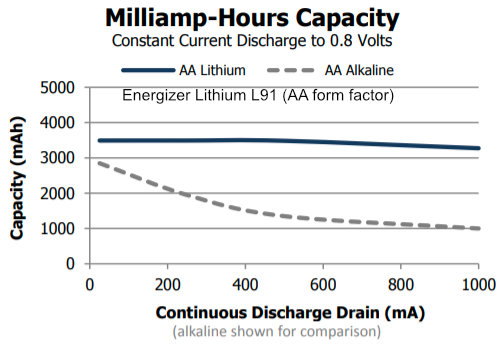
(Energizer Ultimate Lithium data sheet with graphs)
Voltage of Lithium AA Battery
Both batteries have a nominal voltage of 1.5 volts. However the lithium chemistry performs much, much better under load.
Note the apparent open-circuit (no load) voltage of the AA lithium. It’s approximately 1.7 volts. HOWEVER, before you get all worried about that (being more than 1.5 volts)… As soon as the load goes above just a few milliamps, say 10 mA, operating voltage settles in at 1.5 volts. This is where the lithium vs alkaline battery excels.
This AA lithium battery under typical loads will operate in a nice range of approximately 1.5 volts down to about 1.4 volts over time. Nice!
Here’s a photo I just took while measuring open circuit voltage of a new Energizer AA Ultimate Lithium battery.
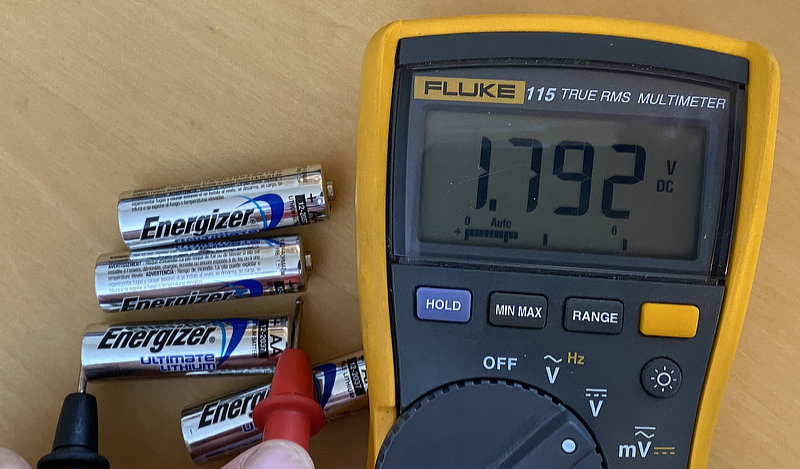
Check the operating manual or quick-start guide of your device. If your device specifically restricts the use of lithium chemistry, well, use the Energizer Max instead. I have never had a problem using the lithium in place of the alkaline in my particular devices. I’m sure that’s because the operating voltage (~ 1.5) falls within the design parameters of most AA powered devices.
Here’s another photo that I just took of the open circuit voltage for an alkaline Energizer MAX battery. Again, it’s under no load. However when operating under load, the operating voltage will range from 1.4 down to about 1.2 depending on load and time spent under load.
(Energizer MAX data sheet with graphs)
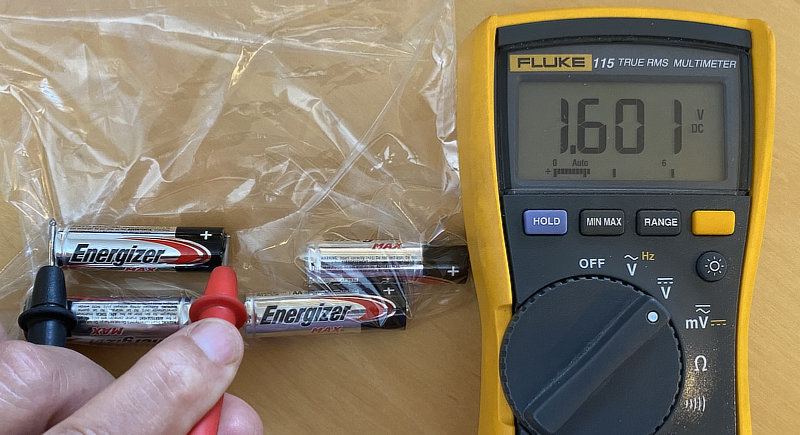
Take a look at the following chart which shows the Energizer lithium L91 (AA size) battery voltage discharge profile.
As you can see, the voltage is higher than 1.5 under a near-zero load. However when it’s placed under load, the voltage comes in at ~ 1.5 volts.
Energizer Lithium Battery L91 (AA form factor) Voltage Discharge Profile
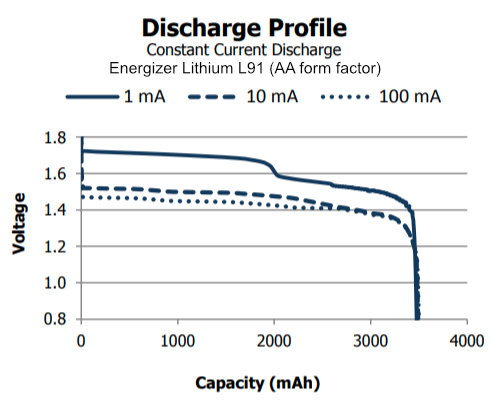
Energizer Lithium L91 (AA) Battery Temperature Performance
Best of all, lithium AA battery cold weather performance is outstanding. A lithium AA-battery will perform substantially better than an alkaline battery when it’s cold.
I have a few driveway alarms on our private road. I use lithium batteries for their transmitters because it can get down to 30 below zero here during the midst of winter. And they continue to perform!
Look at the chart. An alkaline battery will perform pretty well until it gets cold. The differences between cold weather tolerant lithium batteries and alkaline become very, very obvious while under heavy loads.
Either way, lithium wins.
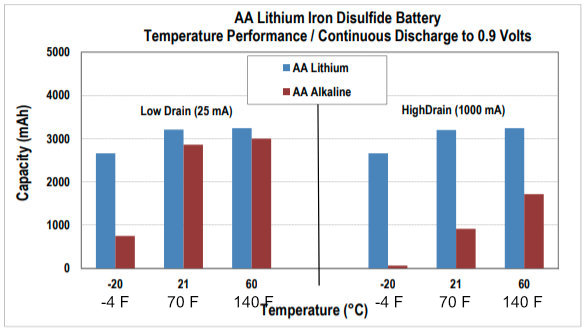
(chart source) (I added degrees-F)
To sum it up, I really like the Energizer Ultimate Lithium battery for many of my demanding applications. I also really like the Energizer Max alkaline battery for normal applications. (But I also utilize rechargeable batteries, but that’s another article…)
I hope that the charts above will help some of you understand the advantages of lithium battery chemistry, particularly for the consumer size AA battery.
By the way, some of the primary (lithium battery) uses for my own “devices” include my driveway & road alarms, other outdoor sensors, the chicken coop automatic door opener, and a few of my tactical style flashlights. There’s probably more, but that’s off the top of my head…
[ Read: AA Batteries That Won’t Leak or Corrode ]
[ Read: Best AA Rechargeable Batteries – The Eneloop – Why I Like Them ]
